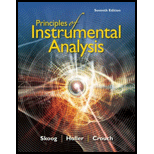
Principles of Instrumental Analysis
7th Edition
ISBN: 9781305577213
Author: Douglas A. Skoog, F. James Holler, Stanley R. Crouch
Publisher: Cengage Learning
expand_more
expand_more
format_list_bulleted
Question
Chapter 21, Problem 21.7QAP
Interpretation Introduction
Interpretation:
The comparison between ISS and RBS, the instrumental setup of both and differences in the information obtained by the two techniques is to be stated.
Concept introduction:
Electron spectroscopy is a method to identify all the elements of the periodic table. This method tells about the oxidation state and the type of bond in atoms of a compound. The electronic structure can be found by this spectroscopy. This method is applicable to all states of compound,
Expert Solution & Answer
Want to see the full answer?
Check out a sample textbook solution
Students have asked these similar questions
Q1-) Give information about the reasons why
instrumental analysis techniques are preferred
over classical analysis techniques.
A spectrophotometer selects for a specific wavelength by:
Group of answer choices
Adjusting the amplifier settings.
Adjusting energy input into the lamp.
Changing aperture size.
A set of wavelength filters.
Modifying the detector sensitivity.
6. In your own words, explain how
spectrophotometer works. List down its parts and
give their corresponding functions.
Knowledge Booster
Similar questions
- Please explain how to use DEPT spectra.arrow_forwardWhat are the nature of spectrum differences between Uv-visible and Fluorescence spectroscopy analysis? Please answer shorty at your own words. Answer should be to the point.arrow_forwardIn an isolated system, A. qcalorimeter = qcold B. qcold = qhot C. qcold = -qhot D. qcold + qcalorimeter = -qhotarrow_forward
- Each individual part in an atomic absorption spectrophotometer has a specific function. Below is listed a number of parts and a choice of functions. Match the specific function with each part by assigning the most correct letter. Note that some statements are only partially true. You must assign the most correct statement A. To convert the sample into a cloud of atoms in their excited state B. To convert the sample into a cloud of atoms in their ground state C. To convert the sample into a cloud of molecules in their ground state D. Corrects for never-seen absorbers in the sample atomizer E. Corrects for all wavelengths from the sample atomizer F. Corrects for the analyte elements present in the sample atomizer G. Corrects for all wavelengths but the analyte wavelength from the sample atomizer H. Corrects for all wavelengths but the analyte wavelength from the source I. Corrects for non-specific absorbers in the hallow cathode J. Corrects for the analyte wavelength from the sample…arrow_forwardi) Discuss the differences between the AES and XPS in terms of principle and information obtained from the spectra.arrow_forward
arrow_back_ios
arrow_forward_ios
Recommended textbooks for you
 Principles of Instrumental AnalysisChemistryISBN:9781305577213Author:Douglas A. Skoog, F. James Holler, Stanley R. CrouchPublisher:Cengage Learning
Principles of Instrumental AnalysisChemistryISBN:9781305577213Author:Douglas A. Skoog, F. James Holler, Stanley R. CrouchPublisher:Cengage Learning Principles of Modern ChemistryChemistryISBN:9781305079113Author:David W. Oxtoby, H. Pat Gillis, Laurie J. ButlerPublisher:Cengage Learning
Principles of Modern ChemistryChemistryISBN:9781305079113Author:David W. Oxtoby, H. Pat Gillis, Laurie J. ButlerPublisher:Cengage Learning

Principles of Instrumental Analysis
Chemistry
ISBN:9781305577213
Author:Douglas A. Skoog, F. James Holler, Stanley R. Crouch
Publisher:Cengage Learning


Principles of Modern Chemistry
Chemistry
ISBN:9781305079113
Author:David W. Oxtoby, H. Pat Gillis, Laurie J. Butler
Publisher:Cengage Learning